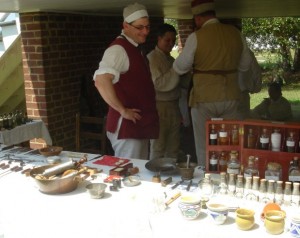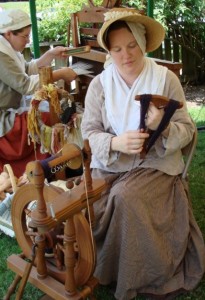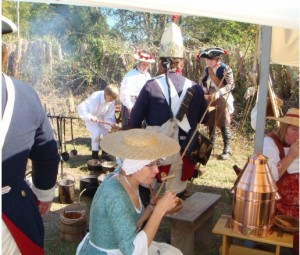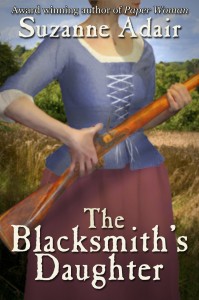From the Vault: I’ve participated in more than a decade of Revolutionary War reenacting with the 33rd Light Company of Foot—as one of their camp followers. Boy, oh boy, those words “camp follower” sure perk the ears of journalists and beg a clarification of what a camp follower does. My explanation often sounds like what’s in the following essay, originally published in 2010 in Mystery Readers Journal, vol 26 no 4, the issue on “Hobbies.” (The pictures weren’t in the original.) In this essay, I discuss giving voice to women of the Revolution so we can learn about “the crushing, undeniable effect of war on humanity.” Note that that voice is loud and clear in my latest release, A Hostage to Heritage.
*****
I write a mystery/suspense series set during the Southern theater of the American Revolutionary War. Several years ago, after I’d described the hobby that best informs my writing, an interviewer said to me, “Honey, you really suffer for your art.” My hobby is Revolutionary War reenacting. During a reenacting weekend, I portray a woman of middle class who is a camp follower.

No, I’m not a military groupie. During the Revolutionary War, any non-combatant civilian who traveled with an army met the definition of what we’d call a “camp follower.” These folks took no commissioning or enlistment vows but were paid in other ways by the army or through interaction with the army. Camp followers in the Revolutionary War included artisans such as blacksmiths and wheelwrights; sutlers like merchants and peddlers; and retainers: family members, servants, slaves, and friends.
Usually when we hear a voice from the Revolutionary War, it’s a man’s voice, a soldier’s tale. Women have a different story to tell about the war. One purpose of my series is to spotlight women in a historically accurate setting and give them their voices.

Why would any woman who wasn’t a prostitute follow an army? In the Revolutionary War, territories changed hands often. The conflict pitted neighbor against neighbor—demonstrated gruesomely in the Southern colonies, where squabbling families used the excuse of war to continue old feuds. Most cities were too small to provide a defense for people. Often an army was the greatest source of protection. When a military force withdrew from an area, civilians who stayed behind became vulnerable and risked torture and death at the hands of enemies. Thus wives left home and marched to the drum with their soldier husbands, bringing with them children and other household members.
A woman who followed an army endured privation. The baggage train where most camp followers traveled was considered worthy of capture. Civilians associated with it often found themselves in the midst of battle. These people also experienced disease, starvation, lack of clothing and shelter, and exposure to the elements. In addition, civilians had to obey military rules. A woman who broke the rules might pay a fine or receive corporal punishment. She could be evicted from camp or executed.

Middle- and lower-class women coped by cobbling together some form of domestic life, normalcy within the military environment and chaos of war. Perhaps they shared a daily meal with their soldiers, or participated in a family activity, such as reading from the Bible. Since women often didn’t receive food rations, they laundered, cooked, mended clothing, and worked in the infirmary for extra pay or food.
These women weren’t early feminists. They did what had to be done, part of the innate ability of women throughout history. Yet the accomplishments of women don’t receive the attention of men’s accomplishments. Stories of war are most often told from the point of view of men, soldiers. Furthermore, we tend to regard women of Revolutionary America through the lens of Victorian society, impose Victorian expectations upon women of Georgian society.
Sometimes in primary research, we must read between the lines to hear the small voice with the true story. When women are allowed to voice their stories, a very different image of war emerges, especially for middle- and lower-class women. We hear the crushing, undeniable effect of war on humanity. I depict these women in my series—especially in my book Camp Follower, where I’ve described the suffering of civilians who traveled with the army that lost the Battle of Cowpens.
If my fiction succeeds in capturing most of what women camp followers endured, then it’s worth sweating beneath my petticoat in the summer, blowing on numb fingers in the winter, and swatting mosquitoes and eating burned food. Who said hobbies must be easy? I look for new experiences and challenges. Maybe for another series, I’ll take up ghost hunting.
**********
Did you like what you read? Learn about downloads, discounts, and special offers from Relevant History authors and Suzanne Adair. Subscribe to Suzanne’s free newsletter.
 “A ripping good read!” — Ann Parker, author of The Silver Rush Mystery Series
“A ripping good read!” — Ann Parker, author of The Silver Rush Mystery Series


